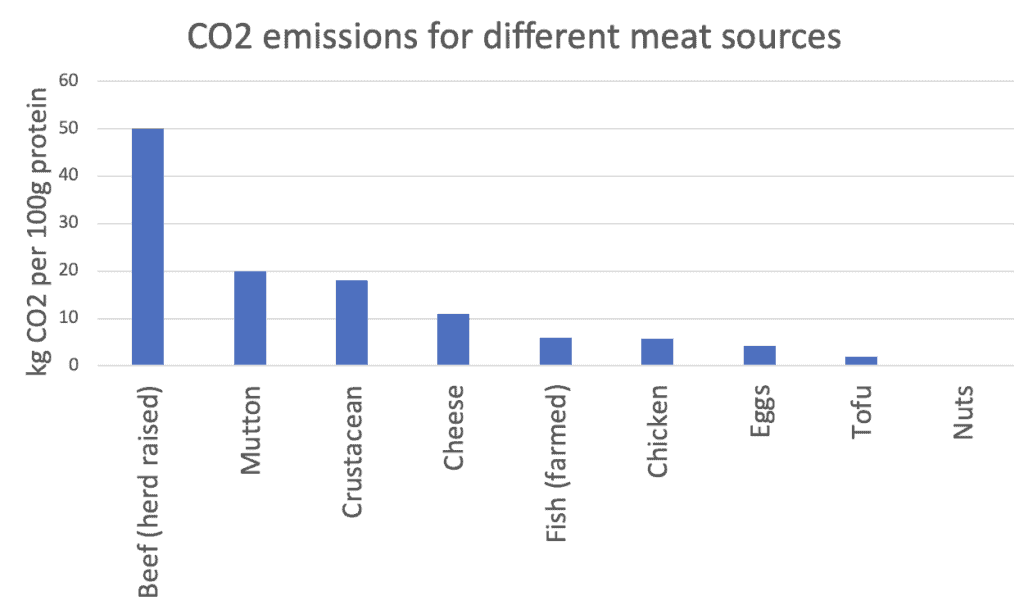Introduction – Meat Is The Food With Highest Contributor To Carbon Per Calorie
A common question regarding diet is whether we should eat less meat. Meat is one of the highest contributors to carbon emissions per consumed calorie. Here we consider holistically reasons that include carbon and health what’s the right amount of meat to consume.
For example, beef is high in cholesterol and saturated fat both of which are linked to cardiovascular disease. The salt content in processed meats such as deli meats, bacon, and sausage is linked to high blood pressure.
Conversely, skinless poultry and fish, on the other hand, are excellent providers of protein. Therefore there are both detriments and health benefits.

Pros And Cons Of Eating Meat Is A Long Standing Debate
The debate over whether people should eat less meat has been going on for years. Some people argue that eating less meat is better for both our health and the environment, while others maintain that meat consumption is a personal choice and not something that should be regulated. So, what’s the truth? Should we all be eating less meat?
Pros: Huge Study Shows Meat Provides Essential Nutrients Including Protein, Iodine, Retinol, Vitamins B12 And D
Many people believe we shouldn’t eat less meat. For one, they say that it’s a personal choice and that each person should be able to decide how much meat they want to eat, without outside interference.
They also argue that there are many health benefits to eating meat, such as getting important nutrients like protein and iron. Of the And finally, they claim that eat-less-meat campaigns are ineffective and that they don’t do anything to address the real problem, which is the way meat is produced.
Data from a study carried out by UK scientists in Oxford called EPIC-NO (European Prospective Investigation into Cancer and Nutrition-Oxford) showed the nutritional impact of the dietary preferences of 30,251 people.
Each person was classified as a “meat eater“, “fish eater“, “vegetarian“, and “vegan“. Comparison of the “meat eater” group vs the ones furthest from meat, the “vegan” group, shows a number of nutritional differences.
| Meat eaters | Fish eaters | Vegetarians | Vegans | |
| n (%) | 18 244 (60) | 4531 (15) | 6673 (22) | 803 (3) |
| Energy (kJ) | 8742a | 8486b | 8367c | 8127d |
| Protein (g/kg of body weight)⁎ | 1.28a | 1.17b | 1.04c | 0.99d |
| Vitamin A (μg of RE) | 1394a | 1098b | 1085b | 1083b |
| Retinol (μg) | 690a | 311b | 316b | 163c |
| Vitamin B12 (μg) | 7.88a | 6.36b | 3.09c | 0.78d |
| Vitamin D (μg) | 3.79a | 3.65b | 1.97c | 1.77d |
| Iodine (μg) | 212.2a | 196.8b | 148.1c | 58.5d |
Meat Is A Great Source Of Vitamin B12
While the consumed energy was quite similar, the meat eater group had 28% more protein in their diet. The meat eater also had 40% more vitamin A, and more than 4 times more retinol.
Strikingly the Vitamin B12 levels of meat eaters is 10 times higher. In fact, the Vegan Society warns vegans to ensure their diet is rich in B12. Vitamin D and Iodine were also respectively 2 times and 4 times higher in meat eaters compared to vegans.
While there’s a good chance that lower levels of nutrients in vegan diets still exceed nutritional recommendations, there’s no guarantee that this is true for all the nutrients. Indeed it seems that at least for vitamin B12 the meat eater diet presents a certain advantage.
Cons: Meat Is A Big Carbon Contributor And Lipid Contents Are Associated With Worse Cardiovascular Health
We have covered extensively the difference between a meat lover, “normal”, vegetarian and vegan diet. The meat lover diet has twice the carbon footprint of a vegetarian diet. In this story, there turns out to be a subtlety.
Among the different meats, beef and mutton have far higher carbon footprint than poultry. If you’re interested you can read out story in more detail about carbon intensity of different meats. Therefore, when it comes to carbon reduction, at least we can say that beef has an outsized impact among the meats.

New meat-mimics and animal fat-mimics have the potential to change the climate and health consequences of a meat-based diet. The technology remains unproven and many years we predict will pass before it matures.
Huge Study Shows Meat Unequivocally Is A Source Of Unhealthy Saturated Fatty Acids
There are a few key reasons why some experts believe we should eat less meat. First, they say that it’s better for our health. They claim that a diet high in animal protein can lead to higher levels of cholesterol and saturated fat, which can, in turn, increase our risk of heart disease and other chronic health conditions.
Additionally, they point out that factory farming – the process by which most meat is produced today – is detrimental to both the environment and the animal’s quality of life.
Finally, they say that eating less meat can help to reduce world hunger, as there would be more food to go around if we all consumed less meat.
The same EPIC-NO study showed that meat eaters consistently have a diet higher in saturated fatty acids (SFA), lower in healthy polyunsatured fatty acids (PUFA), and higher in cholesterol (about 8 times higher!) compared to vegans.
| Meat eaters | Fish eaters | Vegetarians | Vegans | |
| n (%) | 18 244 (60) | 4531 (15) | 6673 (22) | 803 (3) |
| % Energy from SFA | 10.4a | 9.4b | 9.5b | 6.9c |
| % Energy from PUFA | 7.1a | 7.9b | 7.8b | 10.3c |
| Cholesterol (mg) | 259a | 178b | 143c | 35d |
Each one of these have been associated with cardiovascular diseases.
Reducing But Not Eliminating Meat Is A Good Middle Ground – Basically Eat Less Meat
So, what’s the verdict? Should we eat less meat or not? If you’re concerned about your health, the environment, or world hunger, then reducing your meat consumption is a good way to make a positive impact.
On the other hand, if you believe that everyone should be able to make their own choices about what they eat, then you may not want to change your diet.
Tips For Moving Toward Less Meat In Diet – Reduce The Amount Of Beef And Mutton
The bottom line is that the decision of whether or not to eat less meat is a personal one. However, if you are interested in reducing your meat consumption, there are a few things you can do.
1. Cut down in frequency the number of meals with meat
Eat meatless meals one or two days a week. This doesn’t mean you have to go completely vegetarian – on other days you can still eat chicken, fish, or other forms of protein. You might be surprised at how easy it is to find tasty recipes that don’t include meat.
2. Source meat/protein from sustainable sources
When you do eat meat, make sure it’s from a source you trust. This means buying organic, pasture–raised, or grass-fed meat whenever possible. These meats are not only better for your health, but they’re also better for the environment.
Finally, try to avoid processed meats like bacon, sausage, and deli meat, as they tend to be high in fat and salt. Good substitutes are high protein content foods like beans, chickpeas, and new tech foods like algae-based protein which is in development.
3. Replace beef and mutton with poultry which has with lower carbon intensity and lower fat and cholesterol
Switch from beef and mutton to meat sources that incur a lower environmental cost. This means poultry like chickens and turkeys. Poultry not only has less fat and cholesterol, but they’re also low carbon intensity to raise.
Compare their carbon intensity below. Beef that is herd raised has 50 g of CO2 in 100 g of protein. For chicken, the most common poultry meat source, the carbon intensity is ten times lower.

Meatless Mondays – A 20 Year Old Global Movement
Eating less meat is a personal choice, but it can have a positive impact on your health, the environment, and the world. If you’re interested in reducing your meat consumption, start by trying Meatless Monday or another Meat-Free Day.
From there, you can slowly reduce the amount of meat you eat throughout the week. Remember, every little bit counts!
Summary For Tips On How To Eat Less Meat
- Try having meatless meals one or two days a week
- Buy organic, pasture-raised, or grass-fed meat whenever possible
- Avoid processed meats like bacon, sausage, and deli meat
- Reduce the amount of meat you eat throughout the week slowly
Effects Of Eating Less Meat
Benefits:
- Can lead to lower levels of cholesterol and saturated fat
- Factory farming is detrimental to the environment
- Eating less meat can help reduce world hunger
Drawbacks:
- Maybe a personal choice
- There are health benefits to eating meat
- Eat-less-meat campaigns may be ineffective
- Does not address the way meat is produced, only the amount consumed
There are a few different schools of thought when it comes to the subject of meat. For a variety of reasons, some hold the opinion that we ought to cut back on our consumption of meat.
Others think that this is a matter of personal preference and that everybody ought to be entitled to choose for themselves how much meat they wish to consume.
You Might Like: What is a low carbon food?
Protein Alternatives When Eating Less Meat
Each person is responsible for making their own decision on how much meat they eat, even though doing so may have positive effects not just on their health but also on the environment and the greater world.
After you’ve reached that point, you’ll be in a better position to gradually reduce the amount of meat you eat each day of the week. Always keep in mind that even the smallest contribution can make a difference!
Some other sources of protein include:
- Beans
- Lentils
- Tofu
- Tempeh
- Seitan
- Quinoa
- Nuts
- Seeds
How Much Protein Do You Need?
Your daily requirement for protein is based on several factors, the most important of which are your age, the amount of physical activity you get, and the amount of muscle mass you have.
A healthy adult should consume an amount equal to 0.36 grams per pound of body weight daily. Consequently, if you weighed 150 pounds, you would need to consume 54 grams of protein daily.
The amount of protein that is required by the body also increases with age up to a point, and the amount of exercise that is performed. Athletes might require as much as 1 gram of protein per pound of body weight, but active people over the age of 50 might only require 0.5 to 0.75 grams of protein per pound of body weight.
Downsides Of Eating More Meat

While there are health benefits to eating meat, there are also some drawbacks. One of the biggest problems with meat is that it takes a lot of resources to produce. For example, livestock farming is one of the leading causes of deforestation, water pollution, and habitat destruction. It’s also a major contributor to greenhouse gas emissions.
Another downside of eating meat is that it can be difficult to digest. This is because our bodies are not designed to eat large amounts of animal protein. When we eat too much meat, it can lead to indigestion, heartburn, and other digestive problems.
So, should you eat less meat? It’s up to you! If you’re interested in reducing your impact on the environment and eating a healthier diet, then cutting back on meat is a good place to start. Just remember to do your research and make sure you’re getting enough protein from other sources.
Is It Good To Eat Plant-Based Meats
There are many benefits to eating plant-based meats. These are not really meats. Instead they are made from plant-based substitutes. They are usually lower in calories and fat than traditional meats, and they are a good source of fiber.
Technology continues to improve with processing techniques advanced to a point where specific meat ingredients are mimicked by plant ingredients. The start up food company Lypid made a vegan based fat that mimicks the juiciness of animal fat.
Plant-based meats can also be a good choice for people who are trying to eat less meat. Finally plant-based meat has a much lower carbon footprint.
That said, there are a few things to keep in mind when choosing plant-based meats. First, make sure to read the ingredient list. Some plant-based meats may contain fillers or additives that you don’t want to eat.
Second, look for products that are fortified with vitamins and minerals, as these can help to compensate for any nutrients that might be lacking in the plants themselves.
Finally, remember that plant-based meats are not necessarily healthier than traditional meats. They are simply an alternative for people who want to eat less meat.
Conclusion
Consuming less meat is a choice that each individual must make for themselves, although doing so may have beneficial effects on their health, the environment, and the larger world.
If you want to reduce the quantity of meat you eat, the best way to start is by gradually cutting back on the amount of meat you consume each day of the week.
Make sure you don’t forget to do your homework and check to see if you’re receiving adequate protein from other sources. And finally, if you want the most bang for your money in terms of nutrition, go for plant-based meats that have been supplemented with vitamins and minerals.
